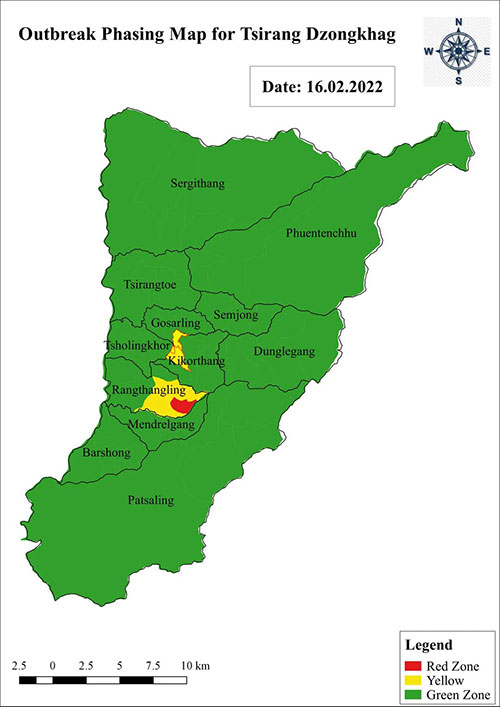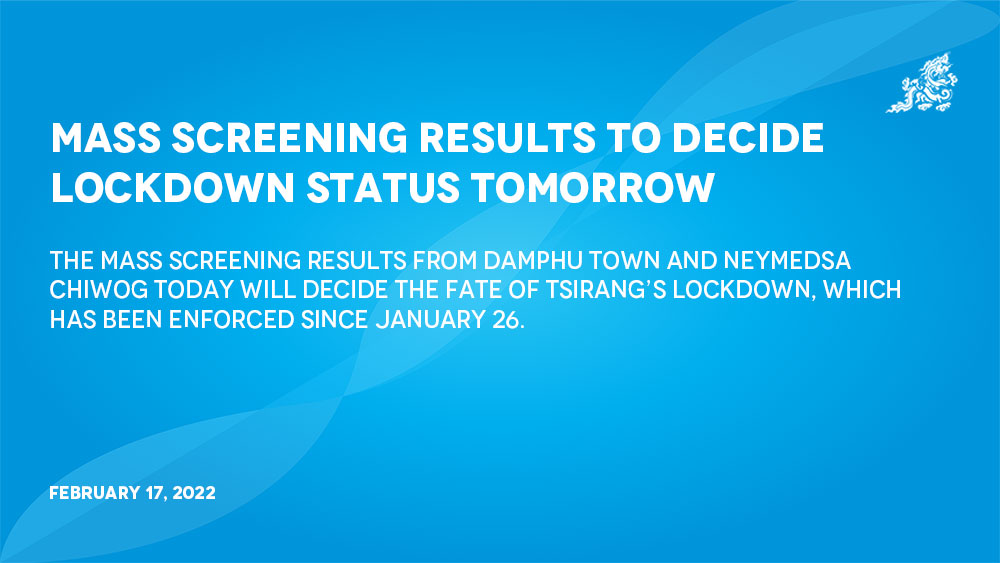Choki Wangmo | Tsirang
The mass screening results from Damphu town and Neymedsa chiwog today will decide the fate of Tsirang’s lockdown, which has been enforced since January 26.
The dzongkhag incident commander, Chewang Rinzin, said they will lift the lockdown if there are no positive cases.
The taskforce announced the transition of six more chiwogs in Rangthangling, Mendrelgang, and Tsholingkhar gewogs to green zones yesterday.
Out of the three villages in Charingma chiwog, which has been earlier declared a red zone in Rangthangling gewog, Daragaon village is the only red zone in the dzongkhag now.
As parts of Rangthangling, Gosarling, and Kilkhorthang gewogs, including Damphu throm are yellow zones, more relaxations in the throm were announced on February 13.
Residents of the three zones within the core of Damphu town are allowed to come out and walk within the zones without movement cards. However, movements into peripheral areas beyond the boundary of the zones and free movement of people from other gewogs to the town are not allowed.

Since February 13, more shops such as garment and footwear, utensils and crockery, stationery and gifts, cosmetics, tailoring, and cobbler; spas and beauty parlours; and recreational spaces have been allowed to open until 8pm.
While people wanting to travel out of the dzongkhag’s green zones should have an e-pass with a negative antigen report, those going out from the yellow zones should have an e-pass with a negative RT-PCR report. Those going out from the red zone have to stay one week in quarantine, need an e-pass, and also a negative RT-PCR report.
The requirements apply to stranded people, local residents, and those people who entered Tsirang and now want to return.
If a person wishing to travel to Wangdue from Gelephu has stayed overnight in Tsirang, he or she has to apply for a new RT-PCR test and e-pass to continue on the journey.
Within the dzongkhag, residents moving from green to red or yellow zones and returning on the same day are escorted in bubble mode transportation at their own expense.
Meanwhile, e-passes are provided upon verification for pick-up or drop-off of essential items at Darachhu and Waklaytar checkpoints.
“We had been ensuring that the spread of the virus is controlled, green zones don’t slip back to yellow and red, and yellow zones don’t slip back to red within the dzongkhag,” Chewang Rinzin said.
He said the task force faced some challenges in the early phase of the outbreak of the virus, such as a shortage of quarantine facilities, isolating positive cases from villages, problems in facilitation of agriculture and livestock products, transport of oranges, availing vegetables due to lockdown in other dzongkhags, and having to send samples to either Gelephu or Thimphu.


